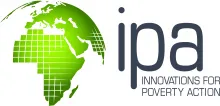Innovations for Poverty Action (IPA) is a research and policy non-profit that discovers and promotes effective solutions to global poverty problems. IPA brings together researchers and decision-makers to design, rigorously evaluate, and refine these solutions and their applications, ensuring that the evidence created is used to improve the lives of the world’s poor.
In recent decades, trillions of dollars have been spent on programs designed to reduce global poverty, but clear evidence on which programs succeed is rare, and when evidence does exist, decision-makers often do not know about it. IPA exists to bring together leading researchers and these decision-makers to ensure that the evidence we create leads to tangible impact on the world. Since our founding in 2002, IPA has worked with over 400 leading academics to conduct over 600 evaluations in 51 countries. This research has informed hundreds of successful programs that now impact millions of individuals worldwide.
Priorities as a partner of the Global Partnership for Sustainable Development Data
IPA is committed to sharing trainings, tools, and best practices widely with researchers, students, practitioners, policymakers, and the general public. We also publicly share and collaborate on effective Stata programs through GitHub.
Since our founding, we have designed and evaluated more than 275 solutions to poverty problems using the most rigorous evaluation methods available. We have over 240 more evaluations in progress, and we have mobilized decision-makers to use the evidence we have to improve opportunities for the poor. We work in the areas of agriculture, education, health, financial inclusion, governance, peace and recovery, small and medium enterprises, and social protection.
IPA values research transparency and we maintain that data-sharing is a key component of transparent research. We ask that researchers register their study with the American Economic Association's Social Science Registry, and that they share their data and code publicly in our data repository, within three years following data collection or with first publication.
